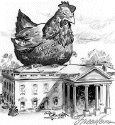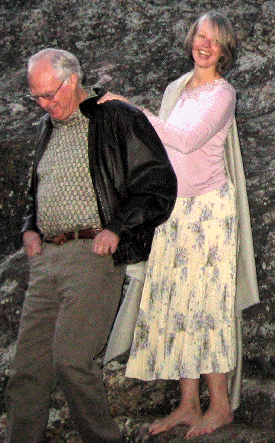
|
||||||||||||||||||||||||||||||||||||||||||||||||||||||
|
Microblogging should be decentralized
Read his whole post and think about what you can do. One thing right off the bat -- if you make a desktop tool for Twitter, you can offer the user the option to store their twitstream as an RSS feed. Just do it in parallel, transparently for the user (although it's a preference). You can key off their Twitter ID. If you want I'll set up a service for free hosting of the feed on Amazon S3 (it's not a very expensive thing) or it's something you could provide as a bonus feature. It's a step in a positive direction for decentralizing. It's not the whole thing, but it's a big part of it. And should Twitter ever go off the air for more than a few days, it'll be the way we put the network back together. Update #1: I took a walk, and thought some more about this. If there were a way to point, from your Twitter account, to an alternate feed, then your desktop client could cache a pointer to the feed for each person you're following. If Twitter were to go down, then the desktop client would fall back to polling the feeds. It would probably be slower, but it would work. If one of the people you follow didn't have an alternate feed, you'd have to wait for Twitter to come back up to find out what's new with them. But if they used a desktop client, and the client was maintaining the feed automatically for each user (subject to a pref), then it would notify Twitter where it was storing the feed. Twitter would just have to maintain one more string for each user, alongside the user's location, link to their website, one-line bio, etc. However: It would require support from Twitter, Inc. to work. Rev Chickens-Come-Home-To-Roost
Yes, Obama is a gifted politician, and that's why we like him. We need political leadership, we've done without it for the last four terms, sixteen years, and we hope that this guy really gets that the power is with us, that we pay the bills, fight the wars, and it's our hard work and innovation that drive the economy that makes America powerful when we are powerful. Wright? He's a deer that got caught in a headlight none of us have ever been in, so we don't really have a right to judge him. He spun around looking for friends, and found he was radioactive, and it really wasn't his fault. He wasn't running for office, in a rhetorical way he totally did inhale and exhale and inhaled again, and again. The only people who really liked his radioactivity were people like Louis Farrakhan and his followers who want to disrupt the US political process. So what to do with the Wright legacy? I feel sorry for him, but I hope he finds some good people who aren't out to destroy other good people and he skips writing the book, and he kicks back and lets the member of his flock take the leadership we want and need him to. See also: Bill Moyers, yesterday, on Rev Wright.
Then you learn that there are two types of water pipes, run by different companies, and it's very rare that both go down at the same time. So, if you can afford it, you get both water suppliers to pipe into your house, and when one goes down, you go to the street, lift a manhole cover, go down a ladder, and disconnect the one that doesn't work and hook up the one that does. It's a hassle for sure, but you always have water. Then someone invents a T-shaped pipe with two inputs and one output. You hook the two suppliers each to a branch and your house to the third. This way when one goes down, you don't even know it. The water keeps flowing, you're happy. It works the same way with the Internet. Some days Comcast goes down, and others AT&T DSL, but they rarely go down at the same time. I have both because the Internet is still young and unreliable, and I've lived with its lack of reliability before and it's worth a hundred bucks a month to have the luxury of uninterrupted service when one or the other goes down. But until yesterday, if I needed to switch over, I'd have to rewire my network just to switch to the other vendor. But, it turns out they make T-pipes for the Internet, they're called Dual-WAN Routers. And I got one. It took a fair amount of fussing-with to get it working, but it has a nice fractional horsepower HTTP server to configure the router, a good help system, and I kind of intuitively get what it does. Comcast is going to like this, their service is so much faster than AT&T's that I set it up so that AT&T is the backup. I won't actually send any packets over their line unless Comcast goes down, or gets pissed at me (it happens) -- but they should note that turning me off will no longer get my attention. And thanks to my parents for buying this lovely gift for me. How did they know I wanted one? Another innovation, Amazon Wishlists. This Dual-WAN Router thing isn't something I would likely buy for myself, too speculative, I wasn't at all sure it would be simple enough to set up, or that I really needed it. There is a recession going on after all. And they never would have had a clue that I was interested. But now I have one and I'm very happy to have it. Why did I decide on Xincom? I read the reviews on Amazon and it seemed the most likely to work. A bunch of us went up to Indian Rock to see the sunset. Click here for the set. |
"The protoblogger." - NY Times.
"The father of modern-day content distribution." - PC World.
One of BusinessWeek's 25 Most Influential People on the Web. "Helped popularize blogging, podcasting and RSS." - Time.
"The father of blogging and RSS." - BBC.
"RSS was born in 1997 out of the confluence of Dave Winer's 'Really Simple Syndication' technology, used to push out blog updates, and Netscape's 'Rich Site Summary', which allowed users to create custom Netscape home pages with regularly updated data flows." - Tim O'Reilly.
My most recent trivia on Twitter. On This Day In: 2007 2006 2005 2004 2003 2002 2001 2000 1999 1998 1997.
|
|||||||||||||||||||||||||||||||||||||||||||||||||||||
|
© Copyright 1997-2008 Dave Winer. Previous / Next |
||||||||||||||||||||||||||||||||||||||||||||||||||||||


 Imagine that water pipes were a new thing, and therefore not reliable. They work for most people most of the time, but sometimes they go down, and then if you want to take a bath or wash the dishes or cook a meal, no luck.
Imagine that water pipes were a new thing, and therefore not reliable. They work for most people most of the time, but sometimes they go down, and then if you want to take a bath or wash the dishes or cook a meal, no luck. 



